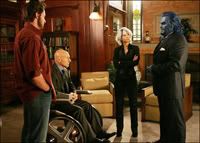
One of the most successful comic book-movie franchises, X-Men continues with the third installment entitled The Last Stand. There were worries that Brett Ratner, taking over Bryan Singer as director, might not be able to keep up with the franchise's unique blend of big-budget, high-octane action, thought-provoking political commentaries, and riveting characters and sensibilities. In many ways, Ratner has managed to put everyone at ease with some interesting surprises.
When an industrialist finds a "cure" for treating human mutations, a war is raged between the militants led by Magneto (McKellen) and the "Homo sapiens." Magneto believes that the "cure" is only the first step toward a mutant genocide. While Dr. Hank McCoy/Beast (Grammer), the Secretary of Mutant Affairs, strives to reach peaceful resolution through diplomacy, the President (Josef Sommer) is ready to use military force against the rebels when necessary.
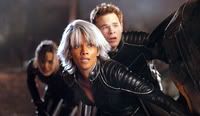
Meanwhile, Logan/Wolverine (Jackman) and Storm (Berry) discover that Jean Grey (Janssen) is still alive. Professor Charles Xavier (Stewart) concludes that Jean is not the same person, but her alter-ego Phoenix, who is the only Class 5 mutant possessing an incredible, deadly power. Unfortunately, Phoenix is ruthless and uncontrollable. When Magneto recruits Phoenix as his secret weapon against the humans, Xavier and his X-Men have no choice but to combat the militants in a war of right vs. wrong.
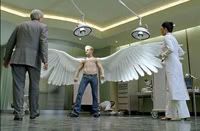 Jackman (Van Helsing) reprises his famous role as Wolverine with the same intensity, broodiness and sensibility. His love for Jean results in tragic consequences, and Jackman's portrayal is heartfelt and heroic, paving the way to the spinoff, Wolverine (2007). This time, Berry (Catwoman) has a bigger role as Xavier's would-be successor. Her character has matured over the years, and Berry handles the subtle growth very well. Together, free-thinking Wolverine and sensible Storm make an interesting team.
Jackman (Van Helsing) reprises his famous role as Wolverine with the same intensity, broodiness and sensibility. His love for Jean results in tragic consequences, and Jackman's portrayal is heartfelt and heroic, paving the way to the spinoff, Wolverine (2007). This time, Berry (Catwoman) has a bigger role as Xavier's would-be successor. Her character has matured over the years, and Berry handles the subtle growth very well. Together, free-thinking Wolverine and sensible Storm make an interesting team.McKellen (The Da Vinci Code) continues his reign as Magneto with relish, turning the role into one of the most sympathetic yet loathed villains in movie history. In contrast, Stewart (Eleventh Hour) is wonderful composed and genuine as the peaceful and philosophical professor. If Wolverine is ever the heart of X-Men, Professor Xavier clearly is the mind and soul behind it. Janssen (The Treatment) has the most interesting task of playing Jean's "evil" twin, Phoenix. But the former Bond girl does "bad" so well that we almost end up not missing Jean Grey.
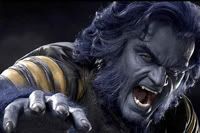 Reprising their respective roles as Rogue, Mystique, Cyclops, Iceman, and Pyro, young actors Paquin (The Squid and the Whale), Romijn (Man About Town), Marsden (The Notebook), Ashmore (The Quiet) and Stanford (The Hills Have Eyes) all do well in helping to move the plot along. Joining the huge cast is Grammer (Even Money) in one of his first post-Frasier roles, and the intelligent yet resourceful Beast is a perfect role for him. Foster (Alpha Dog) also impresses as new mutant Angel.
Reprising their respective roles as Rogue, Mystique, Cyclops, Iceman, and Pyro, young actors Paquin (The Squid and the Whale), Romijn (Man About Town), Marsden (The Notebook), Ashmore (The Quiet) and Stanford (The Hills Have Eyes) all do well in helping to move the plot along. Joining the huge cast is Grammer (Even Money) in one of his first post-Frasier roles, and the intelligent yet resourceful Beast is a perfect role for him. Foster (Alpha Dog) also impresses as new mutant Angel.The story of The Last Stand follows a familiar arc as the previous two X-Men films. While the humans and the mutants try to get along, the undercurrent of unrest escalates and Magneto seizes on the opportunity to rage a war he's been planning all these years. In a way, the similarity between Magneto and Osama Bin Laden is not lost to us -- both are revered leaders holding on to flawed ideologies and resorting to terrorism to achieve their goals. In fact, X-Men touches on so many issues that are allegories to our real-life hot topics including stem cell research, gay rights, global terrorism, war ethics, and conspiracy, to name a few. The plot also involves devastating twists concerning certain main characters such as Xavier, Cyclops and, most important, Jean Grey/Phoenix that is going to leave fans reeling and feeling lost.
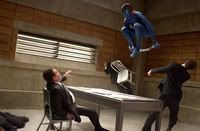 Director Ratner (Red Dragon) doesn't have the same track record as Bryan Singer does, but he more than holds his own with The Last Standing. He does a good job managing the multiple plot threads, interweaving them in interesting ways that move the story along without sacrificing character development. There are key scenes in the film that are very personal and Ratner does a fine job keeping focus without falling into the trap of letting overblown action and special efforts take over.
Director Ratner (Red Dragon) doesn't have the same track record as Bryan Singer does, but he more than holds his own with The Last Standing. He does a good job managing the multiple plot threads, interweaving them in interesting ways that move the story along without sacrificing character development. There are key scenes in the film that are very personal and Ratner does a fine job keeping focus without falling into the trap of letting overblown action and special efforts take over.Unfortunately, while Ratner does a good job balancing the high concepts with over-the-top action sequences, X-Men does seem to tackle too many socio-politcal issues, then skimp over them. Also, the huge cast of new mutants also become tedious and confusing (and some of them are simply ridiculous). Technically, though, The Last Standing is an outstanding film with great entertaining value. Fortunately, the story continues to anchor its emotions on key characters such as Wolverine and Jean Grey, and the audiences continue to care about them. It's not going to win an Oscar for Best Picture or the Nobel Peace Prize; but if this piece of popcorn extravaganza could provoke discussions and thoughts on some of today's most-debated issues, it could only be a good thing. And you can bet this won't be the last X-Men. Not a chance.
Stars: Hugh Jackman, Halle Berry, Ian McKellen, Patrick Stewart, Famke Janssen, Anna Paquin, Kelsey Grammer, Rebecca Romijn, James Marsden, Ben Foster, Shawn Ashmore, Aaron Stanford, Vinnie Jones, Dania Ramirez
Director: Brett Ratner
Writers: Zak Penn, Simon Kinberg
Distributor: Twentieth Century Fox
MPAA Rating: PG-13 for intense action violence, some sexual content, brief nudity, language
Running Time: 149 minutes
Script – 8
Performance – 9
Direction – 8
Cinematography – 7
Music/Sound– 7
Editing – 8
Production – 9
Total – 8.1 out of 10
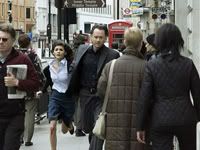
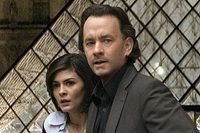 When the curator of the Louvre, Jacques Sauniere (Marielle), is murdered, the French police, headed by detective Fache (Reno), enlists American symbologist Robert Langdon (Hanks) to solve the mystery. It looks like, before he dies, Sauniere has put himself in an unnatural position and marked the scene with a riddle. When specialist Sophie Neveu (Tautou) joins the inquisition, Langdon quickly learns that he is the suspect for the murder. In order to clear his name, Langdon must solve the puzzle and find the real killer.
When the curator of the Louvre, Jacques Sauniere (Marielle), is murdered, the French police, headed by detective Fache (Reno), enlists American symbologist Robert Langdon (Hanks) to solve the mystery. It looks like, before he dies, Sauniere has put himself in an unnatural position and marked the scene with a riddle. When specialist Sophie Neveu (Tautou) joins the inquisition, Langdon quickly learns that he is the suspect for the murder. In order to clear his name, Langdon must solve the puzzle and find the real killer.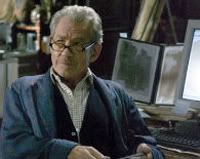 While Hanks (The Polar Express) is a seasoned actor with a mild-mannered disposition, he is miscast for the part of Robert Langdon. He is too demure, reactive, passive and, surprisingly, wooden. Even without reading the book, one could imagine Hugh Jackman or a younger Harrison Ford in this intellectual but heroic role, not Hanks. Luminous French actress Tautou (A Very Long Engagement) seems somewhat lost in this English-speaking role as Sophie Neveu. Even though there is no romance between Langdon and Sophie, the actors still lack certain chemistry together.
While Hanks (The Polar Express) is a seasoned actor with a mild-mannered disposition, he is miscast for the part of Robert Langdon. He is too demure, reactive, passive and, surprisingly, wooden. Even without reading the book, one could imagine Hugh Jackman or a younger Harrison Ford in this intellectual but heroic role, not Hanks. Luminous French actress Tautou (A Very Long Engagement) seems somewhat lost in this English-speaking role as Sophie Neveu. Even though there is no romance between Langdon and Sophie, the actors still lack certain chemistry together.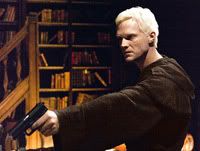 However, we don't go to a movie like the Da Vinci Code to watch Oscar-caliber performances. Goldsman (Cinderella Man) does a good job adapting Dan Brown's highly convoluted and expository novel to the screen. Certain parts of the film still feels confusing, especially if one is not familiar with the novel. Also, the script favors more action and less talk, which is both a merit as well a detriment to the story. The action makes the film more exciting and suspenseful, but it also takes away the intellectual intrigue of the central mystery that Brown did so well explaining in the book -- the main reason why the book is such an international sensation.
However, we don't go to a movie like the Da Vinci Code to watch Oscar-caliber performances. Goldsman (Cinderella Man) does a good job adapting Dan Brown's highly convoluted and expository novel to the screen. Certain parts of the film still feels confusing, especially if one is not familiar with the novel. Also, the script favors more action and less talk, which is both a merit as well a detriment to the story. The action makes the film more exciting and suspenseful, but it also takes away the intellectual intrigue of the central mystery that Brown did so well explaining in the book -- the main reason why the book is such an international sensation.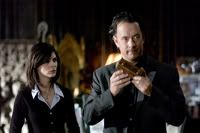 Director Howard (Cinderella Man) is a skilled, popularist filmmaker. The Da Vinci Code reminds us of A Beautiful Mind in its dark, soft hues and intellectual overtone. Howard uses cross-cutting effectively in telling the story from many point of views. While the film still comes across as confusing at some points, Howard does a good job streamlining the plot to make it comprehensible. He also adds character quirks and backgrounds for Langdon (he's claustrophobic) and Sophie (she has a unique gift of calming others) to smooth out the otherwise two-dimensional characters. While the intellectual and historical expositions in the book can be interminable, Howard actually makes a mistake by shortening and rushing through them, by using cheap digital transitional effects. In doing so, the true intrigue of the story (and not the run-of-the-mill treasure-hunt plot) is somehow lost. We want to solve the puzzles ourselves, but Howard doesn't allow us. What excites people about the story is not the wild goose chases or guns, but Robert Langdon's ability to break codes and solve puzzles using his intellect and knowledge, as well as the stories behind the mystery. As is, the film is a few bits short of being a complete code of success.
Director Howard (Cinderella Man) is a skilled, popularist filmmaker. The Da Vinci Code reminds us of A Beautiful Mind in its dark, soft hues and intellectual overtone. Howard uses cross-cutting effectively in telling the story from many point of views. While the film still comes across as confusing at some points, Howard does a good job streamlining the plot to make it comprehensible. He also adds character quirks and backgrounds for Langdon (he's claustrophobic) and Sophie (she has a unique gift of calming others) to smooth out the otherwise two-dimensional characters. While the intellectual and historical expositions in the book can be interminable, Howard actually makes a mistake by shortening and rushing through them, by using cheap digital transitional effects. In doing so, the true intrigue of the story (and not the run-of-the-mill treasure-hunt plot) is somehow lost. We want to solve the puzzles ourselves, but Howard doesn't allow us. What excites people about the story is not the wild goose chases or guns, but Robert Langdon's ability to break codes and solve puzzles using his intellect and knowledge, as well as the stories behind the mystery. As is, the film is a few bits short of being a complete code of success.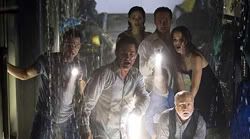
 It's New Year's Eve, and the passengers on the luxurious ocean-liner Poseidon are in for a shock. Dylan Johns (Lucas) is a charming professional gambler who is rather a loner. Robert Ramsey (Russell) is an ex-New York mayor who is rather old-fashioned, especially when it comes to his daughter Jennifer (Rossum) and her boyfriend Christian (Vogel). Suicidal architect Richard Nelson (Dreyfuss) just broke up with his longtime companion. Single mother Maggie James (Barrett) and her son Connor (Bennett) are having a grand time on the ship. Stowaway Elena Gonzalez (Maestro) is on her way to see her sick brother, thanks to the help of cruise employee Marco Valentin (Rodriguez).
It's New Year's Eve, and the passengers on the luxurious ocean-liner Poseidon are in for a shock. Dylan Johns (Lucas) is a charming professional gambler who is rather a loner. Robert Ramsey (Russell) is an ex-New York mayor who is rather old-fashioned, especially when it comes to his daughter Jennifer (Rossum) and her boyfriend Christian (Vogel). Suicidal architect Richard Nelson (Dreyfuss) just broke up with his longtime companion. Single mother Maggie James (Barrett) and her son Connor (Bennett) are having a grand time on the ship. Stowaway Elena Gonzalez (Maestro) is on her way to see her sick brother, thanks to the help of cruise employee Marco Valentin (Rodriguez).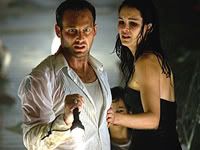 The cast is adequate when you consider the genre. Lucas (Glory Road) handles the conflicted but heroic Dylan with intensity, but there's always this "pained" look on his face, as if the director keeps telling him: "Now, look distressed." Russell (Sky High) is an old pro. His curmudgeon of an ex-mayor is one of the more-rounded characters in the cast. Dreyfuss (Silver City) doesn't really have much to do. His early, pre-disaster scenes are his strongest dramatically.
The cast is adequate when you consider the genre. Lucas (Glory Road) handles the conflicted but heroic Dylan with intensity, but there's always this "pained" look on his face, as if the director keeps telling him: "Now, look distressed." Russell (Sky High) is an old pro. His curmudgeon of an ex-mayor is one of the more-rounded characters in the cast. Dreyfuss (Silver City) doesn't really have much to do. His early, pre-disaster scenes are his strongest dramatically.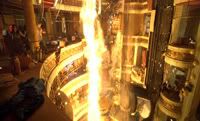 The script by Protosevich (The Cell) rehashes the original movie while changing almost all the characters. Gone are the old fogies like Shelly Winters. Except for Russell and Dreyfuss (who are still in their 50s), the cast consists of mostly young, attractive actors like Lucas and Barrett. Protosevich sticks to the genre conventions. The result, unfortunately, is that "been there, done that" feeling. Granted, he has a tough job -- we all know the story; the only suspense is that who get to live and who don't. There are some fine moments, such as Dreyfuss's fateful decision in the elevator shaft, or the escape through a vent duct. Unfortunately, those moments are far and between.
The script by Protosevich (The Cell) rehashes the original movie while changing almost all the characters. Gone are the old fogies like Shelly Winters. Except for Russell and Dreyfuss (who are still in their 50s), the cast consists of mostly young, attractive actors like Lucas and Barrett. Protosevich sticks to the genre conventions. The result, unfortunately, is that "been there, done that" feeling. Granted, he has a tough job -- we all know the story; the only suspense is that who get to live and who don't. There are some fine moments, such as Dreyfuss's fateful decision in the elevator shaft, or the escape through a vent duct. Unfortunately, those moments are far and between.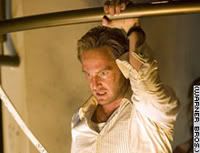 Director Petersen (Troy) rushes through the production. It would have been better if he had spent more time exploring the myriad of characters and showing us the magnificence of the ship before its demise. Part of the charm of the original movie is that we got to care about the characters, and that there was a sense of awe in the destruction of the ship. In this film, we are never allowed enough time to get to know these people, let alone care about whether they live or die. The conflicts between and within the characters are superficial. The special effects are impressive, but also forgettable because there isn't much emotional investment. I think if Petersen had slowed down the pace and refrained from rushing toward the big finale, Poseidon could have been a better, more emotionally satisfying film.
Director Petersen (Troy) rushes through the production. It would have been better if he had spent more time exploring the myriad of characters and showing us the magnificence of the ship before its demise. Part of the charm of the original movie is that we got to care about the characters, and that there was a sense of awe in the destruction of the ship. In this film, we are never allowed enough time to get to know these people, let alone care about whether they live or die. The conflicts between and within the characters are superficial. The special effects are impressive, but also forgettable because there isn't much emotional investment. I think if Petersen had slowed down the pace and refrained from rushing toward the big finale, Poseidon could have been a better, more emotionally satisfying film.
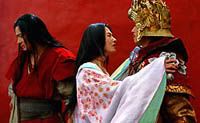 Meanwhile, General Quangming (Sanada) leads the Imperial Army in fighting the Barbarian’s invasion. After witnessing the incredible talent of a slave, Kunlun (Jang), the General acquires Kunlun as his personal slave. Kunlun saves the General from Wuhuan’s (Tse) assassin, Snow Wolf (Liu). Donning the General’s armor, Kunlun inadvertently kills the Emperor and saves the Princess’s life from the pursuit of Wuhuan. Thinking that she was saved by the real General Quangming, the Princess falls in love with him, not knowing that it is Kunlun who really loves her. The quest for her love results in an epic struggle for all involved.
Meanwhile, General Quangming (Sanada) leads the Imperial Army in fighting the Barbarian’s invasion. After witnessing the incredible talent of a slave, Kunlun (Jang), the General acquires Kunlun as his personal slave. Kunlun saves the General from Wuhuan’s (Tse) assassin, Snow Wolf (Liu). Donning the General’s armor, Kunlun inadvertently kills the Emperor and saves the Princess’s life from the pursuit of Wuhuan. Thinking that she was saved by the real General Quangming, the Princess falls in love with him, not knowing that it is Kunlun who really loves her. The quest for her love results in an epic struggle for all involved. The international cast doesn’t do much for the film, either. With the exception of Sanada (The Last Samurai), who brings certain finesse to the role of General Quangming, the performances are generally either bland or over the top. Korean actor Jang (Brotherhood) is handsome, but he is also wooden with only one or two expressions in his repertoire. Cheung (Himalaya Singh) is supposed to be the Helen of Troy of the East, but she comes off looking like a high-class prostitute, and her performance is thin and unconvincing. Tse (New Police Story) is a prissy, two-dimensional villain. Liu (City of Golden Armor) isn’t so bad, but he spends most of his time under a dark hood.
The international cast doesn’t do much for the film, either. With the exception of Sanada (The Last Samurai), who brings certain finesse to the role of General Quangming, the performances are generally either bland or over the top. Korean actor Jang (Brotherhood) is handsome, but he is also wooden with only one or two expressions in his repertoire. Cheung (Himalaya Singh) is supposed to be the Helen of Troy of the East, but she comes off looking like a high-class prostitute, and her performance is thin and unconvincing. Tse (New Police Story) is a prissy, two-dimensional villain. Liu (City of Golden Armor) isn’t so bad, but he spends most of his time under a dark hood.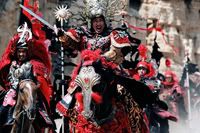 The screenplay by writer-director Chen (Temptress Moon) is a huge disappointment. It’s disjointed, overwrought, excessive, and convoluted. Almost no time is spent on character development. The audiences are spoon-fed with information to help us “get the characters.” The plot is nonsensical and illogical, even for a fantasy. The characters lack real motivations and their actions are often incomprehensible.
The screenplay by writer-director Chen (Temptress Moon) is a huge disappointment. It’s disjointed, overwrought, excessive, and convoluted. Almost no time is spent on character development. The audiences are spoon-fed with information to help us “get the characters.” The plot is nonsensical and illogical, even for a fantasy. The characters lack real motivations and their actions are often incomprehensible.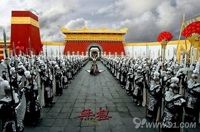 It boggles the mind. How could a man who brought us the exquisite Farewell My Concubine come up with such dreck? The Promise (the original, Chinese title means “Invincible”) is a prime example of how “style over substance” could go horribly wrong. Granted, the cinematography is beautiful, and there are some breathtaking sets and imageries, but a movie should be more than just moving paintings. The subliminal Chinese philosophies of “suffering,” “fate” and “loyalty” are presented in an insufferably oppressive manner. The characters are highly unlikable, and the story extremely incomprehensible. The editing is also very choppy. Mr. Chen’s cinematic capital since Farewell My Concubine is dwindling, and he should promise to never make something like this again.
It boggles the mind. How could a man who brought us the exquisite Farewell My Concubine come up with such dreck? The Promise (the original, Chinese title means “Invincible”) is a prime example of how “style over substance” could go horribly wrong. Granted, the cinematography is beautiful, and there are some breathtaking sets and imageries, but a movie should be more than just moving paintings. The subliminal Chinese philosophies of “suffering,” “fate” and “loyalty” are presented in an insufferably oppressive manner. The characters are highly unlikable, and the story extremely incomprehensible. The editing is also very choppy. Mr. Chen’s cinematic capital since Farewell My Concubine is dwindling, and he should promise to never make something like this again.